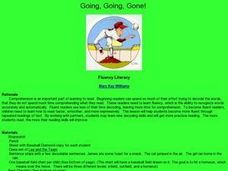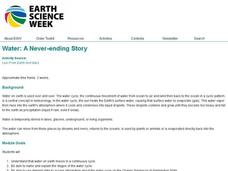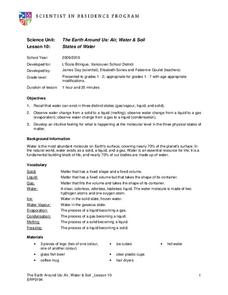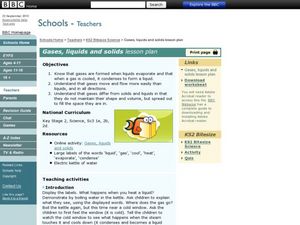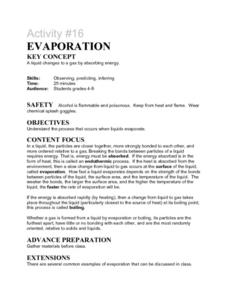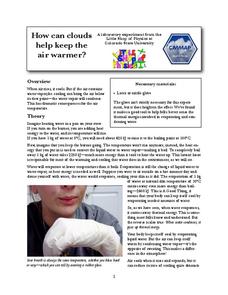Curated OER
The Happy Game: The Water Cycle
Make your students 'happy' about understanding the water cycle with The Happy Game; where young learners put their knowledge to the test to answer questions about evaporation, condensation, and precipitation. Tip: Use this game prior to...
American Chemical Society
The Water Cycle
Bring the water cycle into the classroom without the mess. Learners build a model of the water cycle using everyday materials. They observe the process of evaporation and condensation and relate their observations to the larger scale...
Curated OER
How Do You Dew?
Students examine how the processes of condensation and evaporation occur. They describe the relationship between heat energy, evaporation and condensation of water on Earth. They give examples of the processes of evaporation and...
Curated OER
Rain On
Fourth graders explore evaporation and condensation. In this water cycle lesson, 4th graders investigate their surroundings for real-life examples of evaporation and condensation. Students conduct various experiments.
Curated OER
The Hydrologic (Water) Cycle
Learners construct a model of the hydrologic cycle, and observe that water is an element of a cycle in the natural environment. They explain how the hydrologic cycle works and why it is important, and compare the hydrologic cycle to...
Scholastic
Study Jams! Solids, Liquids, Gases
Your physical science class learns that there are three states of matter, and that adding or removing heat can cause it to change from one state to another. By the animations, printed information, and discussion between RJ and Zoe, they...
American Chemical Society
Energy Foundations
Only 10 percent of an incandescent bulb's energy is used to create light; the remaining 90 percent is heat. In the unit of activities, young chemists examine energy through hands-on activities, videos, discussions, and readings. Scholars...
Curated OER
Going, Going, Gone!
Sixth graders use the scientific method to test variables of evaporation. In this evaporation lesson plan, 6th graders test a wet handprint on a paper towel and relate this experiment to weather conditions.
Curated OER
The Water Cycle
In this water cycle worksheet, learners learn about the 3 different stages of the water cycle: evaporation, condensation and precipitation. They then solve the 12 problems on the page. The answers are on the last page.
Curated OER
Water And Changes Of State (3.1)
In this reviewing water and changes of state worksheet, students answer questions about water vapor, state of water, freezing point of ice, evaporation, condensation, distillation, dry ice, and the water cycle. Students answer...
Curated OER
Sweat Your Socks Off
Fourth graders explore evaporation by conducting an experiment. In this water properties lesson, 4th graders examine the differences between two socks that get wet, one which is placed in front of a fan. Students discuss why the sock...
Curated OER
Water: A Neverending Story
Students investigate the water cycle. In this water cycle science lesson, students participate in a series of activities that demonstrate evaporation, precipitation, and condensation. Students describe their observations using water...
Curated OER
Thermochemistry
In this thermochemistry worksheet, students indicate whether the given processes are endothermic or exothermic reactions. Students complete the phase change diagram as well as define a given set of vocabulary words. Students calculate...
Curated OER
States of Water
Students investigate the 3 states of matter. In this physical science "matter" lesson, students observe and participate in a number of demonstrations involving melting and freezing water. Students observe the effect heat has on changing...
Curated OER
Capillary Action and Adhesion
Students perform classroom experiments to observe adhesion. They perform a second experiment using sand, salt, water, and a heat lamp to observe the principle of capillary action. They also experiment with adhesion in plants.
Curated OER
Water Cycle: Social Studies Online
If you need a presentation that describes the 3 elements of the water cycle then this PowerPoint could be a good starting point. This resource is basic in its presentation and formating, and only defines the words evaporation,...
Curated OER
Burning vs. Heating
Students investigate burning vs. heating and observe the differences. In this burning vs. heating lesson plan, students observe a wooden splint burning and a piece of glass tubing being heated. They answer questions to compare the two...
Curated OER
Gases, Liquids and Solids, evaporate, shape volume,
Students conduct an online experiment to discover what happens to solids, liquids and gases in different temperatures. In this states of matter lesson plan, students get into pairs and work in a virtual laboratory to manipulate heating...
Curated OER
Evaporation of Alcohol and Water
Students investigate the process that occurs when liquids evaporaate. They test water and alcohol to determine which substance evaporates more quickly and relate the rate to energy changes.
Curated OER
Evaporation and Condensation
Students explore how temperature effects the processes of evaporation and condensation and how the air may be polluted by the evaporation of certain compounds. In this temperature lesson students complete a lab and a worksheet.
Colorado State University
How Can Clouds Keep the Air Warmer?
Condensing water warms the air around it. Young scholars consider this concept as they experiment with air temperature around evaporating and condensing water vapor. They simulate the formation of clouds to experience the associated...
Curated OER
Who Wants to be a Millionaire? Changing State
A teacher with talent has created a fun set of review questions on the changing states of matter. Cycle through 15 questions, multiple choice answers, and a monetary reward for guessing correctly. Use this game show PowerPoint to help...
Curated OER
Exploring the Water Cycle
The water cycle is one of earth's most easily observable processes, but demonstrating each step within classroom walls can be a challenge. Through a series of videos and quick demonstrations, cover each aspect of the hydrologic cycle in...
Curated OER
Gravimetric Determination of the Nonvolatile Content of Paint
Here are the instructions for leading your advanced chemists though the process of measuring the nonvolatile components in a sample of paint. No student handout is provided, so you may want to create one based on the procedure explained....









